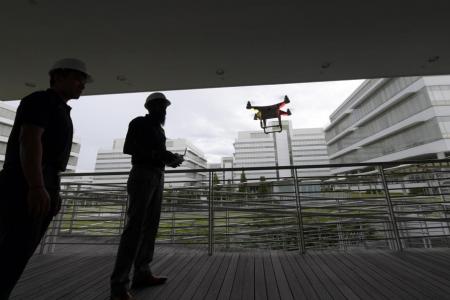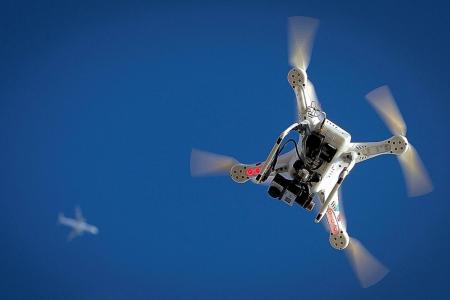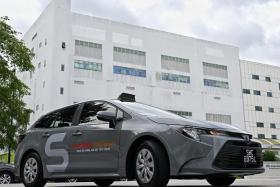One-north to be designated as Singapore’s first drone estate
Expect to see more drones flying around one-north, a research and development hub in Buona Vista that will be designated as Singapore's first drone estate.
The aim is to provide companies and research institutions with an urban environment for testing innovative unmanned aircraft systems (UAS).
This will help the growth of high-tech companies with unmanned aircraft capabilities and spur commercial partnerships, said Transport Minister Khaw Boon Wan yesterday.
He announced the initiative at the opening of the Singapore Airshow Aviation Leadership Summit at Pan Pacific Singapore hotel.
The event was held on the sidelines of the biennial airshow and was attended by civil aviation and airline chiefs, as well as other industry bigwigs.
These included Mr Olumuyiwa Benard Aliu, president of the International Civil Aviation Organisation (ICAO) and Mr Alexandre de Juniac, director-general and chief executive of the International Air Transport Association.
Mr Khaw said: "Singapore has limited airspace and hence, our risk tolerance is low when it comes to UAS operations. Nonetheless, we do not want to miss out on the benefits of UAS."
He noted that several companies, such as Airbus, ST Aerospace and Nanyang Technological University's Air Traffic Management Research Institute, have come on board as "pioneer users of the one-north drone estate".
The Transport Ministry will reveal more details later this week.
The aviation industry is also adjusting to new aircraft technologies, apart from unmanned aircraft, that allow planes to fly farther, bypassing traditional hubs.
To deal with such "disruptions", air hubs and airlines will need new strategies and new business models, and will need to open new routes to adapt to these new aircraft, Mr Khaw said.
And as regulators, "we should enable them to respond nimbly to market opportunities", he added.
The key is to strengthen the foundations of aviation, including ensuring a high level of safety and security, he said. A conducive business environment is also important.
COMPETITIVE
If airlines can be competitive and flexible to expand their operations, passengers can enjoy a wide range of flight options, and airports will benefit from increased traffic, Mr Khaw said. This, in turn, would benefit the wider economy and the people, he added.
Meanwhile, under a new Singapore-ICAO Programme for Young Aviation Professionals, 40 scholarships and 600 fellowships will be offered to young aviation professionals over the next five years.
In total, the programme will provide $6 million in training assistance.
Mr Aliu said: "The global air transport network is poised to double in flight and passenger volumes in the next 15 years, and ensuring sufficient skilled human resources development globally, in support of sustainable future operations, is a very high priority for ICAO."
Get The New Paper on your phone with the free TNP app. Download from the Apple App Store or Google Play Store now




